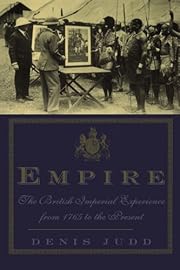

Fai clic su di un'immagine per andare a Google Ricerca Libri.
|
Sto caricando le informazioni... Empire: The British Imperial Experience From 1765 To The Presentdi Denis Judd
 Nessuno Sto caricando le informazioni...
Iscriviti per consentire a LibraryThing di scoprire se ti piacerà questo libro. Attualmente non vi sono conversazioni su questo libro. Nessuna recensione nessuna recensione | aggiungi una recensione
The British Empire radically altered the modern world. At its height, it governed over a quarter of the human race and encompassed more than a fifth of the globe. As well as providing the British people with profits and a sense of international purpose, the Empire afforded them the opportunity to create new lives for themselves through emigration and settlement. It supplied jobs at home and overseas, encouraged national aggrandizement, and allowed experiments in social engineering. For those it ruled over, the Empire often represented arbitrary power, gunboat diplomacy, and the disruption of local customs, social structures, and government by a distant and sometimes coldly unsympathetic administration. Yet while the Empire rested ultimately upon military force and direct rule, it also pulsated with ideals--ideals of freedom, democracy, and even equality.In this impressively researched and always entertaining book, the esteemed British historian Denis Judd analyzes the imperial experience from the American revolution to the present day. He examines the ways in which the British Empire affected both rulers and ruled, and the roles of significant personalities--from Queen Victoria to Nelson Mandela, Cecil Rhodes to Jomo Kenyatta, Joseph Chamberlain to Mahatma GhandiWhat was so special about the ”special relationship” between Britain and the United States? Did the maintenance of the Empire artificially prolong Britain’s Great Power status? Did it encourage chauvinistic, even racist, attitudes? Were subjects better off under their own elites and leaders than under British rule? In the end, what does the balance sheet of the Empire look like?The story of Empire is central to Britain’s national mythology and its sense of place in the world, and essential to an understanding of its changing role as we approach the end of the millennium. Denis Judd’s fine, magisterial history does full justice to a complex and epic theme. Non sono state trovate descrizioni di biblioteche |
Discussioni correntiNessunoCopertine popolari
 Google Books — Sto caricando le informazioni... Google Books — Sto caricando le informazioni...VotoMedia: (3.58) (3.58)
Sei tu?Diventa un autore di LibraryThing. |
||||||||||||||||||||||||||||||||||||||||||||||||||||||||||||||||||||||||||||||||||||||||||||||||||||||||||||||||||||||||